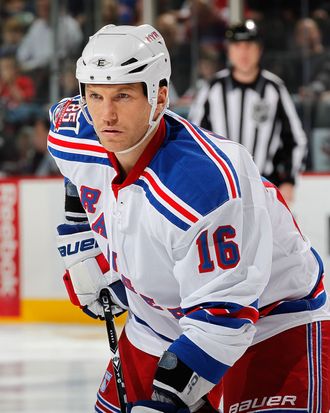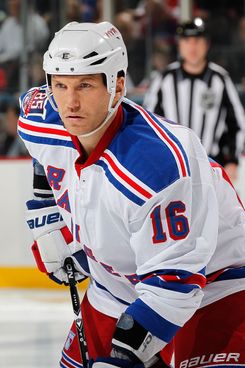

Sean Avery recently spoke out in favor of same-sex marriage, recording this video for New Yorkers for Marriage Equality. (It’s believed that Avery is the first New York athlete to publicly support same-sex marriage.) In the days that followed, Avery’s endorsement remained in the news, first because of an NHL agent, Todd Reynolds, who stated his opposition to it, and later because of the response to Reynolds’s comments. The Sports Section spoke with Jeff Kagan, the director and co-founder of the New York City Gay Hockey Association, about Avery, Brian Burke, and culture of the sport.
What was your initial reaction when you saw the Sean Avery video?
I was blown away. I really was so excited to see that one of the New York Rangers was actually standing up for a cause that no one’s ever stood up for in professional sports, as far as I know. [Ed. Note: at least one other athlete has, in a different state.] And I just think it’s so important, because all the Rangers are role models and to have one of them stand up and fight for something that is just such an important thing for civil rights, I think that it’s a wonderful thing that he’s doing.
Do you think it matters that it’s Sean Avery, someone who’s pretty popular in New York, but is not particularly well liked by a lot of other teams’ fans? Or does something like this transcend hockey?
I think it transcends hockey, and I think it’s important that he’s a well-known Ranger. It’s better that it’s him, and not somebody that no one’s ever heard of. I think celebrity does add a lot of clout to an issue, and when a celebrity speaks up for something, people listen. I’m not sure why sometimes, but they do. So I think that it was good that it was Sean Avery. I mean, he’s not really liked in some parts of the country; in some places in New York he’s not very well liked. But it’s still important that he’s speaking out for something that’s important to other people.
Do you think the culture of hockey is any more or less homophobic compared to other professional team sports?
It’s hard to say. There’s a lot of homophobia in all professional sports, which is why you don’t see any of the professional athletes come out when they’re still playing. I think they’re the ones that see it more than we do, and that’s probably what limits them from saying anything until they retire and they feel safer about doing it. I don’t know that hockey has more of it, though I do know that hockey is probably one of the tougher sports. I mean, hockey and football are the two big impact sports. I think that’s a big part of it, the physical stuff.
What about among fans? I was reading a 2008 article in the Times, which talks about the “Homo Larry” chants at the Garden, and about how your organization’s name was booed when it went up on the scoreboard. Do you think that kind of thing is more common at hockey games than at other sports?
Well, I can’t really answer that honestly, because I don’t really go to that many professional sports games. I’ve been to a few Yankees games, but mostly I’ve gone to Rangers games. So I don’t really know the other sports. I’ve never been to a professional basketball game. But from what I have seen with hockey, it is a very common thing. I think to some people, it’s just a part of the game. But I think those people really need to be re-educated, and learn that what they’re doing is offensive to other people that might be in the arena with them, and it’s offensive to people that aren’t even there. If you’re sitting next to somebody, and they’re yelling out these things, and they say something that offends you, because you might have gay friends, then that’s a problem as well.
Do you think that Avery taking the stance that he did on this issue will have an impact on those fans, and make them think twice about saying something like that?
Unfortunately, I don’t think it’s going to really do much. It’s going to do something, and there will be some fans that will say, “Wow, Sean Avery, that’s great that he’s doing that. Maybe I should reconsider it, and support this cause, or learn more about it.” What I really think needs to happen is that the rest of the Rangers have such a great opportunity here. It’s a great opportunity for the Garden, and all of the organizations to stand up, and show that they support what Sean Avery is saying, and encourage other athletes and other role models in the organizations to do the same thing. I think that’s the thing that I’m worried about, that the Rangers are not going to step up to do this. I think I read, as of yesterday in the Daily News, that they still hadn’t said a word, and they didn’t want to comment on Sean Avery’s PSA.
Do you expect them to say something?
I don’t know why they’re being so reluctant. I can’t imagine what they think they’re going to lose by speaking up. I’d like to say I expect them to do it. I actually had approached Madison Square Garden a few months ago about having an LGBT night at a Rangers game or at a Knicks game, and they did seem interested. They said we had to wait until the playoffs were over and we could discuss it. So I know that they do have an interest in promoting the game to a gay and lesbian fan base. But for them to come out and support this issue and back Sean Avery, that would be a whole bigger ball of wax, and that’s something that I’m hoping they do. I’m just not sure if they will.
Not long after Avery’s video was released, a hockey agent tweeted that he disagreed with Avery’s stance. Did that surprise you?
I guess I was a little surprised. His name was Todd Reynolds, and for him to come out and say that it will always be wrong, it just sounds like such a pig-headed opinion. And those are the kind of people that no matter how much you can show them that a certain subject is right versus wrong, they’re not going to care. They’re only going to have their own opinion. And he said he’s not a bigot, he says not homophobic, but I think it’s really apparent. You don’t even have to say, “Yeah, you are.” It’s just so apparent from what he’s saying. And it’s really sad that he did that, especially because, again, he’s a role model, and he’s somebody that’s sort of in the public eye, and that other professional athletes work with and are represented by. And I would definitely put a call out to all the professional athletes who are represented by him and say, is this really the guy you want representing you? With opinions like this that are really negative, and just so close-minded.
I was reading one blog that talked about how one of the things that’s come out of this is that the backlash to that agent has been pretty strong. What are your thoughts on that reaction?
I think it’s just as important for somebody to stand up against a statement like this as it is for something like Madison Square Garden to stand up for a statement like Sean Avery’s. I think that it’s important that there are people who are against what Todd Reynolds said, and there are repercussions. I think there was a newscaster that said on the air that he supports Todd Reynolds and his entire statement, and he was fired the next day. So I do think that it’s important when these things are called out.
What do you think the impact of Brendan Burke and Brian Burke is, in terms of potentially changing the culture around hockey?
I think that that entire incident is so sad, but I do think it’s going to have a positive effect. For Brian Burke to now be so involved in gay rights, as he is, in an homage to his son — I think he’s a very highly respected individual, he’s a role model for all the other hockey players that are out there. People that have worked with him, or played on his teams, they love him so much, and they respect him so much. And for Brian Burke to be the one that’s saying that this is what’s got to be changed and that this is what has to happen next, is going to really lead the way to helping get more straight athletes involved in the gay community, and try to bridge the gap between the two. So I think that it’s a very positive thing that’s been happening, as a result of such a sad event.
Hockey, to this point, has had Brian Burke and Sean Avery do what they’ve done, and last year, Brent Sopel rode with the Stanley Cup in Chicago’s Pride Parade. Do you think that the culture is changing in hockey more than in other sports?
Yeah, definitely. I think you can see there’s been a pattern. There is more visibility with involvement in the gay community. I haven’t really seen much with the Yankees, or in baseball in general across the country. Same thing for football and for basketball. I think those four big sports, hockey is the one that seems to be more in touch with reaching out to the gay community, and kind of bringing things together, making things right. I was so impressed with the Stanley Cup being in the Pride Parade. That was a big, big, big deal.
How much more do you think the culture still has to change before an active player would be comfortable coming out?
I think it’s going to happen soon. I think it’s going to happen in the next year or two, maybe three. What has to change is that the hockey organizations have to really emphasize that it’s not a problem if somebody wants to come out in their organization. And they have to be there to support that player as well. It’s interesting, because Sean Avery had said a couple of weeks back, which really blew my mind, that if a player on the Rangers wanted to come out, he would be standing next to him in the locker room. If the organizations themselves make it clear to the players that nothing will change in your career — and this organization will still respect you, as we do now, if you want to come out — that’s really what’s going to make a change, and it has to start at the top. It can’t start from the player saying I want to come out. It has to start from the organization saying, “You guys, if there’s anyone on this team that feels that they’re not comfortable coming out, we’re going to stand behind you. We’re not going to let anything bad happen.” So it’s got to come from the top.